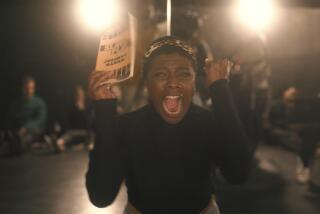Theater review: ‘We Are Proud to Present’ and a time of genocide
Theodor Adorno’s oft-quoted, much misunderstood remark, “It is barbaric to write poetry after Auschwitz,” raises questions about the ability of artists to represent the Holocaust. How can the cultural tools that were complicit in genocide comment on its barbarity?
Jackie Sibblies Drury has written a spry metatheatrical play to grapple with just this type of knotty problem. Her unwieldy title encodes the difficulty of her project: “We Are Proud to Present a Presentation About the Herero of Namibia, Formerly Known as Southwest Africa, From the German Sudwestafrika, Between the Years 1884-1915.”
The setting of Drury’s drama, which is having its West Coast premiere courtesy of the Matrix Theatre Company, is a rehearsal hall, in which a company of six actors sets out to create a theater piece on the genocide that took place in German Southwest Africa at the beginning of the 20th century.
PHOTOS: Arts and culture in pictures by The Times
The performers enter the room, one munching potato chips, another on a bike, all very much in the bubble mentality of young working actors. They limber up, make small talk, greet one another with unnecessary hugs before the company leader (Julanne Chidi Hill), the lone black woman, gets them down to business.
An introductory lecture, complete with audiovisual aids, is intended to provide an audience with necessary historical background on Namibia. All is still a clumsy work in progress, but the imperative of remembering drives these actors on.
The facts are bloody: The German practice of capriciously favoring one tribe over another combined with an imperial reliance on forced labor led to revolts with disastrous consequences for the colonized. The Herero tribe was decimated.
“The general issues the extermination order,” an actor ominously intones. Another chillingly informs us: “Eighty percent of the Herero have been exterminated. Those that survived the camps were used as a source of unpaid labor by the German settlers. And in this way, the German regime continued….”
The trouble these actors are having in creating this piece is that their primary source material is a cache of letters written by Germans about their African experience. (The Herero record is tragically less accessible.) A white actor (John Sloan) considers these letters indispensable. But a black actor (Joe Holt) asks, “Are we just going to sit here and watch some white people fall in love all day?”
“Where are all the Africans?” he demands to know. His fear is that in concentrating on the German experience the company will inadvertently erase the experience of the Herero. History, in effect, will repeat itself, with tragedy being reduced to a kind of indefensible farce.
Drury’s approach to the racial conflict is refreshingly unschematic. The actors who play Another White Man (Daniel Bess) and Another Black Man (Phil LaMarr) would rather defuse the situation than fuel it, though tempers inevitably flare. And the sole white female is too immersed in questions of motivation to take a decisive stand.
Viewing political reality through the lens of theatrical collaboration is a time-tested dramatic formula, one that has been employed by such divergent writers as Peter Weiss and Athol Fugard. Drury is better at playfully setting up her conceit than in developing it. The combustion that’s generated — and it gets fairly intense in the closing moments — seems somewhat contrived. The emotion isn’t fully earned.
Jillian Armenante’s production doesn’t quite have the precise focus Drury’s intentionally scattered play requires. But the liveliness of the cast maintains the playwright’s remarkably light touch — especially impressive given the heaviness of the subject matter.
“We Are Proud to Present” falters a bit in its cathartic stretch, but the work accomplishes something signally important: In recalling a traumatic chapter of African history, it magnifies the biases and conflicts that are inextricably part of the act of remembrance itself.
----------------------------------
‘We Are Proud to Present A Presentation About the Herero of Namibia, Formerly Known as South-West Africa, From the German Sudwestafrika, Between the Years 1884-1915’
Where: The Matrix Theatre, 7657 Melrose Ave., L.A.
When: 8 p.m. Thursdays-Saturdays, 2 p.m. Sundays. Ends August 11.
Tickets: $30
Contact: (323) 960-7724or https://www.matrixtheatre.com
Running time: 1 hour, 40 minutes
More to Read
The biggest entertainment stories
Get our big stories about Hollywood, film, television, music, arts, culture and more right in your inbox as soon as they publish.
You may occasionally receive promotional content from the Los Angeles Times.











